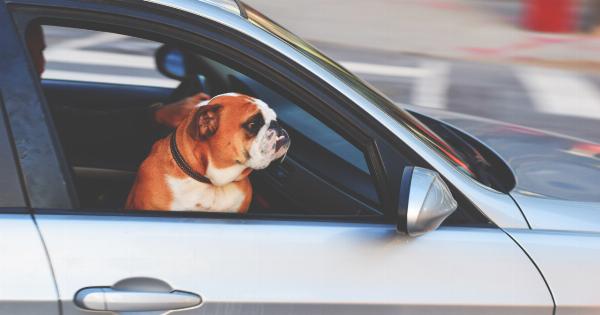Traveling with your beloved pet can be an exciting and rewarding experience. Whether you’re going on a road trip or jetting off to a faraway destination, having your furry companion by your side can make the journey much more enjoyable.
However, it’s essential to be aware of the regulations and requirements surrounding pet travel to avoid any fines or penalties. In this article, we will discuss some common pet travel fines and provide you with useful tips to ensure a smooth and hassle-free journey for you and your furry friend.
1. Failure to Meet Health and Vaccination Requirements
One of the primary reasons pet owners face fines while traveling is the failure to meet health and vaccination requirements. Different countries have distinct regulations regarding pet health, vaccinations, and quarantine protocols.
For instance, some countries may require specific vaccinations, such as rabies, and proof of a recent veterinary health check-up. Failure to meet these requirements can result in hefty fines, denial of entry, or even quarantine of your pet upon arrival.
To avoid such fines, it’s crucial to research and understand the health and vaccination requirements of your destination before you travel.
Schedule a visit to your veterinarian well in advance of your trip to ensure your pet is up to date on all necessary vaccinations and receives a clean bill of health. Carry all relevant documents and certificates with you, including a pet passport if applicable, to provide proof of your pet’s health and vaccination status.
2. Transportation Violations
When traveling with your pet, it’s essential to follow the transportation guidelines set by airlines, train operators, or other modes of transport. Failure to adhere to these guidelines can lead to fines or even being denied boarding.
Some common transportation violations include:.
a. Improper Crate or Carrier
If you’re traveling by air, using an airline-approved crate or carrier is a must. Airlines have specific requirements concerning the size, construction, and material of the crate or carrier.
Ensure your pet’s crate or carrier meets these guidelines to avoid fines. It’s also essential to label the crate with your contact information and affix a “Live Animal” sticker to indicate the presence of a pet inside.
b. Failure to Secure Your Pet
During road trips, it’s crucial to secure your pet properly within the vehicle to ensure their safety and minimize distractions. Many jurisdictions now have laws mandating the use of pet restraints or harnesses while driving.
Failing to secure your pet can result in fines and pose a significant risk to their well-being. Invest in a quality pet restraint system or harness that suits your pet’s size and type and always follow the local laws and regulations.
3. Not Respecting Pet Bans or Restrictions
It’s vital to respect destination-specific pet bans or restrictions to avoid fines and legal complications.
Some countries, regions, or accommodations have strict rules regarding pets, including breed-specific bans, size restrictions, or limitations on the number of pets allowed. Violating these rules can lead to fines, delays, or even forced separation from your pet.
Prior to your trip, thoroughly research your destination’s pet policies. Consult official government websites, contact hotels or accommodations, and join online forums to gather accurate information.
It’s better to make alternative arrangements or choose a different destination that welcomes your pet rather than risking fines and other consequences.
4. Environmental Littering and Cleanliness
When traveling with a pet, it’s crucial to maintain cleanliness and respect the local environment. Failing to clean up after your pet or allowing them to cause damage can result in fines and negative perceptions from locals and authorities.
To avoid this:.
a. Carry Waste Disposal Bags
Always carry waste disposal bags and promptly clean up after your pet, whether you’re on a hiking trail, visiting a park, or exploring urban areas.
Leaving pet waste behind not only carries the risk of fines but also pollutes the environment and poses health risks to others.
b. Keep Your Pet on a Leash
Even if your pet is well-behaved and obedient, it’s essential to keep them on a leash or under strict control in public spaces. Loose pets can damage property, scare or harm others, and can attract fines or penalties.
Following leash laws and respecting the local regulations will help ensure a positive experience for everyone involved.
5. Incorrect or Incomplete Documentation
Another common reason pet owners face fines during travel is due to incorrect or incomplete documentation. It is essential to prepare and carry all necessary documents to ensure a smooth journey. Some important documents include:.
a. Identification Tags
Ensure your pet always wears a collar with identification tags containing your contact information, including a cell phone number. This will help reunite you with your pet if they get lost during the journey.
b. Microchip Information
If your pet has a microchip, ensure all contact information on the microchip database is up to date. This will greatly increase the chances of reuniting with your pet if they go missing.
c. Travel Permits and Health Certificates
Some countries or airlines require specific travel permits or health certificates for pets. Research the requirements well in advance and obtain the necessary permits and certificates before your journey.
Failure to do so may result in fines, denied entry, or quarantine of your pet.
6. Inadequate Pet Preparation
Proper preparation is vital when traveling with your pet to avoid any unforeseen fines or complications. Some essential steps to take include:.
a. Preparing for Long Journeys
If you’re embarking on a long journey, ensure your pet is comfortable and well-acclimated. Gradually increase the duration of your pet’s travel in the days leading up to the trip.
Additionally, pack enough food, medication (if necessary), water, and familiar toys to keep your pet content during the journey.
b. Researching Pet-friendly Accommodations
Before your departure, research and book pet-friendly accommodations. Look for hotels, vacation rentals, or campsites that welcome pets and have suitable facilities.
It’s crucial to inform the accommodation provider about your pet’s size, breed, and any specific requirements to avoid any surprises or fines.
c. Keeping Your Pet Calm and Comfortable
Some pets may experience stress or anxiety during travel. Taking steps to ensure their comfort can help minimize any behavioral issues they may exhibit.
Familiarize your pet with their crate or carrier before the journey, use pheromone sprays or calming aids if necessary, and provide them with a comfortable bed or blanket to make them feel secure.
d. Planning for Breaks and Exercise
During long journeys, it’s essential to plan for regular breaks and opportunities for your pet to stretch their legs and relieve themselves.
Research pet-friendly rest stops, parks, or designated areas along your route where your pet can safely exercise and use the bathroom.
By taking the time to adequately prepare and meet all the necessary requirements, you can significantly reduce the risk of pet travel fines and ensure a smooth and stress-free journey for both you and your furry companion.






























